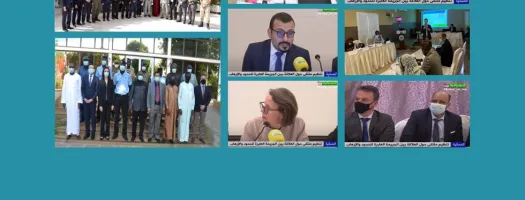The linkages between terrorism and organized crime represent a serious threat to security and development at the national, regional, and international level. Member States have expressed increasing concerns about terrorists benefiting from organized crime as a source of financing or logistical support. The linkages between these criminal actors relate to trafficking in arms, persons, drugs, artefacts, cultural property, natural resources, and wildlife; the abuse of legitimate commercial enterprises and non-profit organizations; illicit donations and crowdfunding; and other proceeds of criminal activity, including kidnapping for ransom, extortion, bank robbery, as well as piracy and arm robbery at sea.
The United Nations has addressed this issue through an increasing number of resolutions, including the Security Council resolutions 2482 (2019) and 2462 (2019) and the seventh review of the United Nations Global Strategy (GA 75/291) in 2021.
The nexus between terrorist groups and criminal networks is undermining stability and development efforts in many countries of the world. Given that terrorist violence is increasing in the African region, addressing these challenges and the relevant security threats is one of the key priorities identified during the United Nations 2021 Global Counter-Terrorism Review.
To respond to this need, the United Nations Office on Drugs and Crime (UNODC) and the United Nations Interregional Crime and Justice Research Institute (UNICRI) – two leading agencies working in this field – are supporting Member States by sharing knowledge and expertise, enhancing capacity and promoting a comprehensive approach to prevent and counter the linkages between terrorism and transnational organized crime.
Within this framework, UNODC and UNICRI held three capacity-building workshops in Chad (N’Djamena); Mali (Bamako – which took place online) and Mauritania (Nouakchott) in October and November 2021. The workshops, conducted in partnership with the Government of the Federal Republic of Germany, and the Republic of France, were attended by 50 participants representing different national entities including the Ministry of Justice, the Ministry of Public Security, the Ministry of National Defense, the Customs, the National Agency for Financial Investigations, the National Agency for Computer Security and Electronic Certification, the National Gendarmerie, the Anti-Money Laundering and Terrorist Financing Unit, the National Directorate of Judicial Affairs and Seal (DNAJS), the Court of Appeal, the Regional Court, the General Prosecutor’s Office, the Specialised Judicial Pole, the Intelligence Service, the National Financial Information Processing Unit and the General Directorate of State Security.
The workshops aimed to discuss the national and international legal framework to counter the phenomenon and to present good practices and challenges in law enforcement and judicial cooperation. The workshops represented an important opportunity to consult with the Chadian and Mauritanian authorities; shape new approaches and join forces to address collectively this shared challenge.
Enhancing capacities to identify the linkages between transnational organized crime and terrorism, as well as the factors that facilitate such convergences, strengthening interagency and international coordination and cooperation between relevant stakeholders are crucial steps for an effective response to tackle this global phenomenon.
The trainings were delivered by experts from UNODC, UNICRI, the International Criminal Police Organization (INTERPOL), the Police of Niger; and the African Centre for the Study and Research on Terrorism (CAERT).
As a long-term plan, UNODC and UNICRI seek to expand the nexus programme not only to other African countries but also other regions of the world, given the global scale of the issue.
Countering the nexus between terrorism and organized crime requires a comprehensive approach involving knowledge sharing, capacity-building, interagency coordination, and transnational cooperation.


